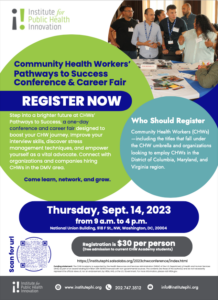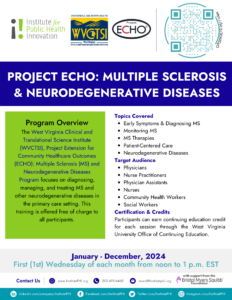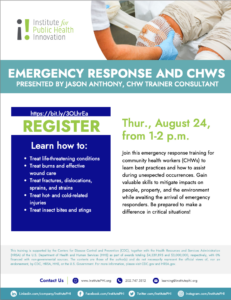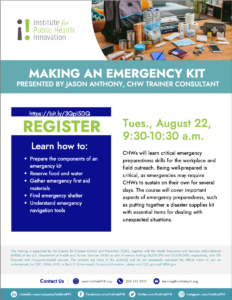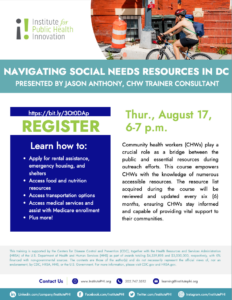
National Community Health Worker Awareness Week (NCHWAW) is here! From August 28 to September 1, NCHWAW is a transformative campaign to raise awareness about community health workers’ (CHWs) role and impact. The National Association of Community Health Workers (NACHW) launched this national event to recognize CHW’s invaluable contributions, promote authentic partnerships, and advocate for policies to uplift the profession. IPHI will join NACHW to commemorate, celebrate, and collaborate in highlighting CHWs’ critical work in advancing public health.
In honor of this week, IPHI’s CHWs for a Healthy VA initiative presents, “Our Community, Our Story: Community Health Workers Making an Impact Across Virginia.”
Monday, August 28 – CHWs are Champions of Change
CHWs are powerful change agents because they actively drive transformative impacts in healthcare and communities. As shown in the Our Community, Our Story video, CHWs empower individuals, families, and communities to take control of their health in under-resourced areas, whether rural or urban. CHWs work tirelessly to promote positive behavioral changes and healthier lifestyles. IPHI’s CHW initiatives equip CHWs with the knowledge, tools, and support they need to make a difference in community members’ lives. By addressing social determinants of health, promoting health equity, and providing personalized support, IPHI’s CHW programs invest in the CHW workforce to create lasting changes for vulnerable populations.
For more details about this week, visit here.
Tuesday, August 29 – Pathway to Becoming a CHW
Discover the pathway to becoming a CHW! CHWs wear many hats, making it an umbrella term for promotoras, family advocates, outreach specialists, and 90+ other titles. IPHI values ongoing education and training to help CHWs adapt to community needs. Continuing education series, community of practices series, and training/technical assistance are some training courses and services available.
There will also be an in-person opportunity on September 14 from 9 a.m. to 4 p.m. The CHWs’ Pathways to Success Conference and Career Fair is hosted by IPHI’s CHW Academy, an initiative under the Zee Turner Center for CHW Workforce Development. This event provides workforce development opportunities, fills knowledge gaps, and connects you with organizations eager to hire CHWs. Don’t miss this chance to advance your career! If you haven’t already, register here.
Wednesday, August 30 – CHWs Making an Impact
Those with first-hand experience of CHW support and care can attest to their impact on the individuals and communities they serve. CHWs create long-term change through genuine connections and dedicated efforts, making them indispensable to the community. Trudy is one of many inspiring success stories:
Trudy, a senior citizen in Richmond, was excited to interview for a job as a bus monitor with Richmond Public Schools but realized she would have to take three buses to get to work by 6 a.m. Not only is taking three buses a grueling way to start the day, but the GRTC buses don’t start running until 6 a.m. Luckily for Trudy, her CHW advocate, Bre Peoples, was determined to find a way to help her. After discovering that Trudy wasn’t old enough to get transportation help through Senior Connections, Bre remembered that GRTC had a morning caravan. The morning caravan was a perfect solution that Trudy might never have discovered.
Other tangible differences that CHWs make for healthier communities include:
- CHWs for a Healthy VA sent over 6,000 referrals to hospitals, food banks, housing assistance programs, and more in the past two years.
- DC & PGC Gets Vaxxed! connected 400+ community members to get their COVID-19 boosters.
- The case investments in CHWs:
Thursday, August 31 – Celebrating CHWs
IPHI expresses our heartfelt appreciation to CHWs and those at IPHI – your unwavering dedication and compassion make a significant difference in the lives of countless people. We thank our CHWs for their contributions, which include:
- Danyell Bucey
- Kim Desormeaux
- Sawa Kamara
- April Wilson
- Antonio Hernandez
- Grace Lowe
- Emily Carrico
- Marangelie Cornelio
- Katie Monday
- Ronnette Moton
- Claudia Artero
- Raquel Mazareigos
- Karina Escobar
- Mauricio Sujo
- Marta Benitez-Hernandez
- Kaire Caballero
- Charmaine Ingleton
- Yaitza Lopez
These CHWs are valuable IPHI members, and our work would not be possible without them. While we celebrate CHWs’ efforts, we also recognize the importance of prioritizing personal well-being to avoid burnout. Self-care is essential for CHWs to continue their work. Save the date for the Project ECHO: CHW Community of Practice training session on October 5, which will focus on self-care strategies to improve resilience and overall health.
IPHI invites you to download and share this certificate of appreciation to recognize and thank the CHWs in your community.
Friday, September 1 – Spreading the CHW Role
We want to acknowledge that many people outside of the public health field may be unfamiliar with CHWs. To bridge this gap, we created a short and engaging video that shows some of the areas CHWs help. Share this video to help us raise awareness and celebrate CHWs importance to public health:
